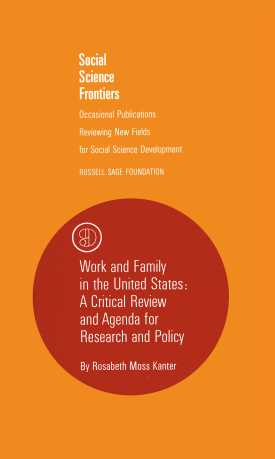
Work and Family in the United States
About This Book
Now considered a classic in the field, this book first called attention to what Kanter has referred to as the "myth of separate worlds." Rosabeth Moss Kanter was one of the first to argue that the assumes separation between work and family was a myth and that research must explore the linkages between these two roles.
ROSABETH MOSS KANTER holds the Ernest L. Arbuckle Professorship at Harvard Business School, where she specializes in strategy, innovation, and leadership for change.
Download
RSF Journal
View Book Series
Sign Up For Our Mailing List
Apply For Funding
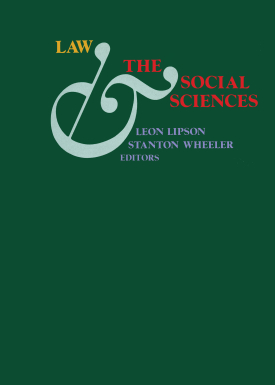
Law and the Social Sciences
About This Book
The notion of law as a social phenomenon would have surprised educators and scholars a century ago. For them, law was a science and the library was the ultimate source of all legal knowledge. Our contemporary willingness to see law in a social context—reflecting social relations, for example, or precipitating social changes—is a relatively recent development, spurred during the last quarter century by the work of a generation of scholars (mostly social scientists and law professors) who believe the perspectives of the social sciences are essential to a better understanding of the law.
Law and the Social Sciences provides a unique and authoritative assessment of modern sociolegal research. Its impressive range and depth, the centrality of its concerns, and the stature of its contributors all attest to the vitality of the law-and-society movement and the importance of interdisciplinary work in this field.
Each chapter is both an exposition of its author’s point of view and a survey of the pertinent literature. In treating such topics as law and the economic order, legal systems of the world, the deterrence doctrine, and access to justice, the authors explore overlapping themes—the tension between public and private domains, between diffused and concentrated power, between the goals of uniformity and flexibility, between costs and benefits—that are significant to observers not only of our legal institutions but of other social systems as well.
LEON LIPSON was Henry R. Luce Professor Emeritus of Jurisprudence and Paul C. Tsai Professorial Lecturer in Law at Yale University.
STANTON WHEELER was Ford Foundation Professor Emeritus of Law and the Social Sciences and professorial lecturer in law at Yale University.
CONTRIBUTORS: Richard L. Abel, Shari Seidman Diamond, Phoebe C. Ellsworth, Mark Galanter, Julius G. Getman, Jack P. Gibbs, Jeffrey L. Jowell, Edmund W. Kitch, Leon Lipson, Stewart Macaulay, David R. Mayhew, Sally Falk Moore, Austin D. Sarat, Richard D. Schwartz, Stanton Wheeler.
Download
RSF Journal
View Book Series
Sign Up For Our Mailing List
Apply For Funding
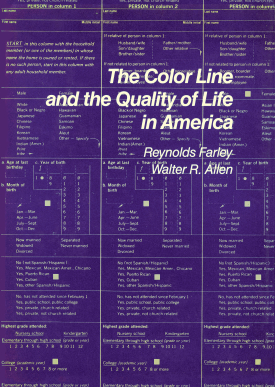
The Color Line and the Quality of Life in America
About This Book
Is the United States a nation divided by the “color line,” as W.E.B. Dubois declared? What is the impact of race on the lives of Americans today? In this powerful new assessment of the social reality of race, Reynolds Farley and Walter Allen compare demographic, social, and economic characteristics of blacks and whites to discover how and to what extent racial identity influences opportunities and outcomes in our society. They conclude that despite areas of considerable gain, black Americans continue to be substantially disadvantaged relative to whites.
REYNOLDS FARLEY is professor of sociology at the University of Michigan and research scientist at its Population Studies Center.
A Volume in the RSF Census Series
Download
RSF Journal
View Book Series
Sign Up For Our Mailing List
Apply For Funding
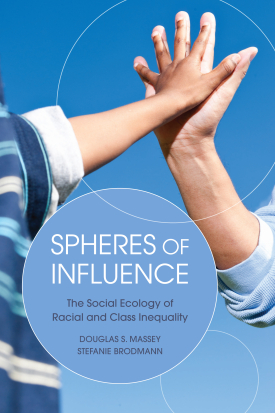
Spheres of Influence
About This Book
“Douglas Massey and Stefanie Brodmann provide an ambitious and rigorous examination of how inequality exerts its influence in the lives of young Americans. Analyzing a national longitudinal study and focusing on multiple social contexts—including school, religion, peers, and neighborhoods—the authors discover important new facts and evaluate competing explanations for a diverse set of outcomes. Whether about depression, crime, sexual behavior, obesity, drinking, or human capital attainment, the results are fascinating. Spheres of Influence should be required reading for social scientists and policymakers seeking comprehensive knowledge on the social ecology of class and race inequality.”
—Robert J. Sampson, Henry Ford II Professor of the Social Sciences, Harvard University
“Spheres of Influence is a pathbreaking book exposing the vast complexities in how race and class intersect in affecting development and well-being as people move from adolescence into adulthood in the United States. The comprehensiveness of the theory and findings about the ways that highly diverse social ecologies of family, school, neighborhood, peers, and religion set the stage for vast inequalities in social outcomes is unparalleled.”
—Lauren J. Krivo, professor of sociology and criminal Justice, Rutgers University
The black-white divide has long haunted the United States as a driving force behind social inequality. Yet, the civil rights movement, the increase in immigration, and the restructuring of the economy in favor of the rich over the last several decades have begun to alter the contours of inequality. Spheres of Influence, co-authored by noted social scientists Douglas S. Massey and Stefanie Brodmann, presents a rigorous new study of the intersections of racial and class disparities today. Massey and Brodmann argue that despite the persistence of potent racial inequality, class effects are drastically transforming social stratification in America.
This data-intensive volume examines the differences in access to material, symbolic, and emotional resources across major racial groups. The authors find that the effects of racial inequality are exacerbated by the class differences within racial groups. For example, when measuring family incomes solely according to race, Massey and Brodmann found that black families’ average income measured $28,400, compared to Hispanic families’ $35,200. But this gap was amplified significantly when class differences within each group were taken into account. With class factored in, inequality across blacks’ and Hispanics’ family incomes increased by a factor of almost four, with lower class black families earning an average income of only $9,300 compared to $97,000 for upper class Hispanics. Massey and Brodmann found similar interactions between class and racial effects on the distribution of symbolic resources, such as occupational status, and emotional resources, such as the presence of a biological father—across racial groups. Although there are racial differences in each group’s access to these resources, like income, these disparities are even more pronounced once class is factored in.
The complex interactions between race and class are apparent in other social spheres, such as health and education. In looking at health disparities across groups, Massey and Brodmann observed no single class effect on the propensity to smoke cigarettes. Among whites, cigarette smoking declined with rising class standing, whereas among Hispanics it increased as class rose. Among Asians and blacks, there was no class difference at all. Similarly, the authors found no single effect of race alone on health: Health differences between whites, Asians, Hispanics, and blacks were small and non-significant in the upper class, but among those in the lower class, intergroup differences were pronounced.
As Massey and Brodmann show, in the United States, a growing kaleidoscope of race-class interactions has replaced pure racial and class disadvantages. By advancing an ecological model of human development that considers the dynamics of race and class across multiple social spheres, Spheres of Influence sheds important light on the factors that are currently driving inequality today.
DOUGLAS S. MASSEY is Henry G. Bryant Professor of Sociology and Public Affairs at the Woodrow Wilson School.
STEFANIE BRODMANN is an economist at the Social Protection and Labor Unit of the World Bank.
RSF Journal
View Book Series
Sign Up For Our Mailing List
Apply For Funding
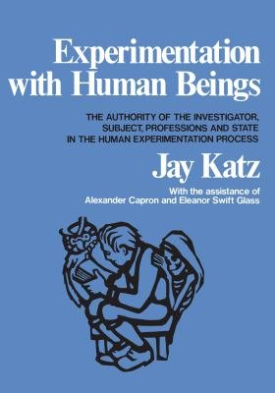
Experimentation with Human Beings
About This Book
In recent years, increasing concern has been voiced about the nature and extent of human experimentation and its impact on the investigator, subject, science, and society. This casebook represents the first attempt to provide comprehensive materials for studying the human experimentation process.
Through case studies from medicine, biology, psychology, sociology, and law—as well as evaluative materials from many other disciplines—Dr. Katz examines the problems raised by human experimentation from the vantage points of each of its major participants—investigator, subject, professions, and state. He analyzes what kinds of authority should be delegated to these participants in the formulation, administration, and review of the human experimentation process. Alternative proposals, from allowing investigators a completely free hand to imposing centralized governmental control, are examined from both theoretical and practical perspectives.
The conceptual framework of Experimentation with Human Beings is designed to facilitate not only the analysis of such concepts as “harm,” “benefit,” and “informed consent,” but also the exploration of the problems raised by man’s quest for knowledge and mastery, his willingness to risk human life, and his readiness to delegate authority to professionals and rely on their judgment.
JAY KATZ is the Elizabeth K. Dollard Professor Emeritus of Law, Medicine, and Psychoanalysis at the Yale Law School.
RSF Journal
View Book Series
Sign Up For Our Mailing List
Apply For Funding

Surveying Subjective Phenomena, Volume 1
About This Book
In January 1980 a panel of distinguished social scientists and statisticians assembled at the National Academy of Sciences to begin a thorough review of the uses, reliability, and validity of surveys purporting to measure such subjective phenomena as attitudes, opinions, beliefs, and preferences. This review was prompted not only by the widespread use of survey results in both academic and non-academic settings, but also by a proliferation of apparent discrepancies in allegedly equivalent measurements and by growing public concern over the value of such measurements.
This two-volume report of the panel’s findings is certain to become one of the standard works in the field of survey measurement. Volume I summarizes the state of the art of surveying subjective phenomena, evaluates contemporary measurement programs, examines the uses and abuses of such surveys, and candidly assesses the problems affecting them. The panel also offers strategies for improving the quality and usefulness of subjective survey data. In volume II, individual panel members and other experts explore in greater depth particular theoretical and empirical topics relevant to the panel’s conclusions.
For social scientists and policymakers who conduct, analyze, and rely on surveys of the national state of mind, this comprehensive and current review will be an invaluable resource.
CHARLES F. TURNER is professor of Applied Social Research at the City University of New York.
ELIZABETH MARTIN is research associate at the National Research Council.
CONTRIBUTORS: Robert P. Abelson, Barbara A. Bailar, Marian Ballard, Theresa J. Demaio, Otis Dudley Duncan, Baruch Fischhoff, Lester R. Frankel, William H. Kruskal, Michael B. Mackuen, Catherine Marsch, Elizabeth Martin, Sara B. Nerlove, Howard Schuman, Tom W. Smith, Charles F. Turner
Download
RSF Journal
View Book Series
Sign Up For Our Mailing List
Apply For Funding
Since the 1960s, more immigrants have settled in Southern California than in any other metropolitan region of the world. About one-quarter of all adults living in San Diego County and neighboring Los Angeles and Orange Counties are children of immigrants, as are one half of all children and adolescents.
Pagination
- Previous page
- Page 45
- Next page
